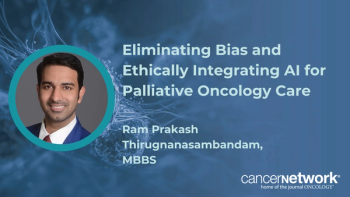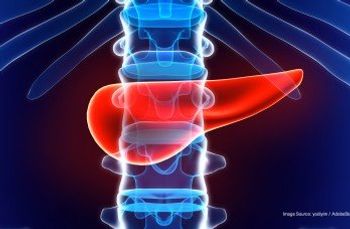
Lenvatinib Following Initial Immunotherapy Improves Survival in Liver Cancer Subtype
Lenvatinib yields survival benefit in hepatocellular carcinoma following progression on immunotherapy.
Investigators observed an improvement in overall survival (OS) and progression-free survival (PFS) in patients who received lenvatinib (Lenvima) for advanced hepatocellular carcinoma following progression on a prior immunotherapy, according to findings presented at the
Results from the trial showed that from the time of lenvatinib administration, the median PFS was 3.7 months (95% CI, 3.2-6.6) and median OS was 12.8 months (95% CI, 6.7-19.5). These results are comparable with survival findings from other studies using lenvatinib as first-line therapy. Additionally, having a Child Pugh score of A was a predictor of survival for patients in the trial.
While patients may benefit from treatment with lenvatinib following initial progression on immunotherapy, the optimal sequencing of therapy for these patients with advanced HCC remains unknown.
Lenvatinib, a multikinase inhibitor that gained FDA approval in the first-line for patients with advanced HCC. However, atezolizumab (Tecentriq) and bevacizumab (Avastin) are considered new standards of care as first-line therapy based on findings from the IMBrave150 trial (NCT03434379).
In this trial, the combination of atezolizumab and bevacizumab led to statistically significant and clinically meaningful improvements in OS compared with sorafenib (HR, 0.58, 95% CI, 0.42-0.79; P < .001), and PFS (HR, 0.59, 95% CI, 0.47-0.76; P < .001).
A total of 501 patients were followed for a median of 15.6 months. The median OS seen was 19.2 months with the combination vs 13.4 months with sorafenib, and the median PFS was 6.8 months vs 4.3 months, respectively. Treatment with atezolizumab plus bevacizumab also led to an improved confirmed objective response rate (ORR) vs sorafenib at 27.3% (95% CI, 22.5%-32.5%) vs 11.9 % (95% CI, 7.4%-18.0%) with sorafenib. In the combination arm, ongoing responses were seen in 86.5% compared with 68.4% of the sorafenib arm.
However, investigators, including Jennifer Gile, MD, hematology/oncology fellow at the Mayo Clinic, looked to determine the optimal sequencing therapy for patients following progression on immunotherapy. As a result, a multicentric, retrospective analysis was created to evaluate this in patients with advanced HCC who were diagnosed between 2010 and 2021.
The primary end points of the trial were OS and PFS.
Investigators identified 53 patients with advanced HCC who were administered lenvatinib following immunotherapy. The median age at the start of lenvatinib was 67 years (range, 39-84), 83% of the patients were male, 42 (79%) patients had a Child-Pugh score of A at diagnosis, and 30 (58%) patients remained Child-Pugh A at time of lenvatinib initiation. Additionally, the median mass body index was 26.7 (range, 19.6-47.9), 20 patients (56.6%) received prior embolization, 9 (17%) received prior ablation, and 6 (11.3%) received prior radiation therapy.
Lenvatinib was given to 45 (85%) patients in the 2nd line and to 8 (15%) patients in the third-line or later. Thirty-eight (72%) patients had died at the time of data extraction.
Regarding safety, the most common adverse events of any grade were fatigue (53%), hypertension (37%), aspartate aminotransferase (AST) elevation (30%), anorexia (28%), bilirubin elevation (25%) and diarrhea (25%).
A total of 21 (40%) patients reported grade 3 or higher adverse events. These included hypertension (25%), confusion (6%), acute kidney injury (2%), hyperkalemia (2%), alanine aminotransferase elevation (2%), proteinuria (2%), arthralgia (2%), heart failure (2%), AST elevation (2%), bilirubin elevation (2%), palmar-plantar erythrodysesthesia (2%), oral mucositis (2%), weight loss (2%), hypothyroidism (2%), anorexia (2%), fatigue (2%) and diarrhea (2%).
Additionally, treatment was stopped due to adverse events in 7 patients, including fatigue in 2 patients, confusion in 2, and heart failure, hypertension, and elevated bilirubin in 1 patient each.
Reference
Gile J, Palmer M, Storandt M, et al. Outcomes of patients receiving lenvatinib following immunotherapy in patients with advanced hepatocellular carcinoma. Poster Presented at: 2023 Gastrointestinal Cancers Symposium; January 19-21, 2023; San Francisco, CA. Abstract 507.
Newsletter
Stay up to date on recent advances in the multidisciplinary approach to cancer.












































